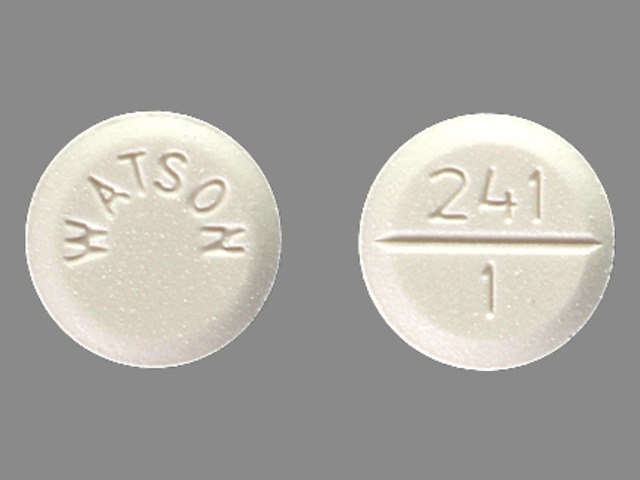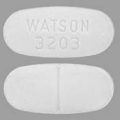
The white round pill with the imprint Watson 241 1 has been identified as containing lorazepam 1mg and supplied by Watson Laboratories, Inc. Lorazepam belongs to a class of drugs known as benzodiazepines which act on the brain and nerves (central nervous system) to produce a calming effect. This drug works by enhancing the effects of a certain natural chemical in the body (GABA).
Watson 241 1 may be habit forming. Do not take a larger dose, take it more often, or for a longer time than your doctor tells you to. Tell your doctor if you have ever drunk large amounts of alcohol, if you use or have ever used street drugs, or have overused prescription medications. Do not drink alcohol or use street drugs during your treatment. Drinking alcohol or using street drugs during your treatment with Watson 241 1 also increases the risk that you will experience these serious, life-threatening side effects. Also tell your doctor if you have or have ever had depression or another mental illness.
Watson 241 1 may cause a physical dependence (a condition in which unpleasant physical symptoms occur if a medication is suddenly stopped or taken in smaller doses), especially if you take it for several days to several weeks. Do not stop taking this medication or take fewer doses without talking to your doctor. Stopping Watson 241 1 suddenly can worsen your condition and cause withdrawal symptoms that may last for several weeks to more than 12 months. Your doctor probably will decrease your Watson 241 1 dose gradually.
Call your doctor or get emergency medical treatment if you experience any of the following symptoms: unusual movements; ringing in your ears; anxiety; memory problems; difficulty concentrating; sleep problems; seizures; shaking; muscle twitching; changes in mental health; depression; burning or prickling feeling in your hands, arms, legs or feet; seeing or hearing things that others do not see or hear; thoughts of harming or killing yourself or others; overexcitement; or losing touch with reality.
Why is this medication prescribed?
Watson 241 1 is used to relieve anxiety. Watson 241 1 is in a class of medications called benzodiazepines. It works by slowing activity in the brain to allow for relaxation.
How should this medicine be used?
Follow the directions on your prescription label carefully, and ask your doctor or pharmacist to explain any part you do not understand. Take Watson 241 1 exactly as directed.
Other uses for this medicine
Watson 241 1 is also used to treat irritable bowel syndrome, epilepsy, insomnia, and nausea and vomiting from cancer treatment and to control agitation caused by alcohol withdrawal. Talk to your doctor about the possible risks of using this medication for your condition.
This medication may be prescribed for other uses. Ask your doctor or pharmacist for more information.
What special precautions should I follow?
Before taking Watson 241 1,
- tell your doctor and pharmacist if you are allergic to Watson 241 1 , alprazolam (Xanax), chlordiazepoxide (Librium, in Librax), clonazepam (Klonopin), clorazepate (Gen-Xene, Tranxene), diazepam (Valium), estazolam, flurazepam, oxazepam, temazepam (Restoril), triazolam (Halcion), any other medications, or any of the ingredients in Watson 241 1 tablets or concentrate. Ask your doctor or pharmacist for a list of the ingredients.
- tell your doctor and pharmacist what prescription and nonprescription medications, vitamins, nutritional supplements, and herbal products you are taking or plan to take. Be sure to mention any of the following: antihistamines; digoxin (Lanoxin); levodopa (in Ritary, in Sinemet, in Stalevo); medications for depression, seizures, Parkinson’s disease, asthma, colds, or allergies; muscle relaxants; oral contraceptives; probenecid (Probalan, in Col-Probenecid); rifampin (Rifadin, Rimactane, in Rifamate, in Rifater); sedatives; sleeping pills; theophylline (Elixophyllin, Theo 24, Theochron); tranquilizers; and valproic acid (Depakene). Your doctor may need to change the doses of your medications or monitor you carefully for side effects.
- tell your doctor if you have glaucoma. Your doctor will probably tell you not to take Watson 241 1.
- tell your doctor if you have or have ever had seizures; or lung, heart, or liver disease.
- tell your doctor if you are pregnant, plan to become pregnant, or are breastfeeding. If you become pregnant while taking Watson 241 1 , call your doctor immediately.
- talk to your doctor about the risks and benefits of taking this medication if you are 65 years of age or older. Older adults should take lower doses of Watson 241 1 because higher doses may not be more effective and are more likely to cause serious side effects.
- if you are having surgery, including dental surgery, tell the doctor or dentist that you are taking Watson 241 1.
you should know that this medication may make you drowsy. Do not drive a car or operate machinery until you know how this medication affects you.
What special dietary instructions should I follow?
Unless your doctor tells you otherwise, continue your normal diet.
What should I do if I forget a dose?
If you take several doses per day and miss a dose, skip the missed dose and continue your regular dosing schedule. Do not take a double dose to make up for a missed one.
What side effects can this medication cause?
Watson 241 1 may cause side effects. Call your doctor if any of the following symptoms are severe or do not go away:
- drowsiness
- dizziness
- tiredness
- weakness
- dry mouth
- diarrhea
- nausea
- changes in appetite
- restlessness or excitement
- constipation
- difficulty urinating
- frequent urination
- blurred vision
- changes in sex drive or ability
Some side effects can be serious. If you experience any of these symptoms or those listed in the IMPORTANT WARNINGS section, call your doctor immediately or get emergency medical treatment:
- shuffling walk
- persistent, fine tremor or inability to sit still
- fever
- severe skin rash
- yellowing of skin or eyes
- irregular heartbeat
Watson 241 1 may cause other side effects. Call your doctor if you have any unusual problems while you are taking this medication.
If you experience a serious side effect, you or your doctor may send a report to the Food and Drug Administration’s (FDA) MedWatch Adverse Event Reporting program online (http://www.fda.gov/Safety/MedWatch) or by phone (1-800-332-1088).
What should I know about storage and disposal of this medication?
Keep this medication in the container it came in, tightly closed, and out of reach of children. Store it at room temperature and away from excess heat and moisture (not in the bathroom).
It is important to keep all medication out of sight and reach of children as many containers (such as weekly pill minders and those for eye drops, creams, patches, and inhalers) are not child-resistant and young children can open them easily. To protect young children from poisoning, always lock safety caps and immediately place the medication in a safe location – one that is up and away and out of their sight and reach. http://www.upandaway.org
Unneeded medications should be disposed of in special ways to ensure that pets, children, and other people cannot consume them. However, you should not flush this medication down the toilet. Instead, the best way to dispose of your medication is through a medicine take-back program. Talk to your pharmacist or contact your local garbage/recycling department to learn about take-back programs in your community. ALSO READ: How Long Lorazepam Stay In Breast Milk




